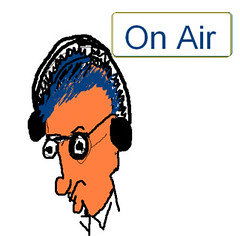Here’s a list of the articles you can listen to on the ICT & Computing in Education website.
Read MoreListening, by Terry Freedman

Listening, by Terry Freedman
Here’s a list of the articles you can listen to on the ICT & Computing in Education website.
Read More
Terry’s desk, by Terry Freedman
Here are 4 useful bits of news. Topics covered: a forthcoming prize draw, podcast posts, a great-looking conference and my elbow.
Read MoreThe headline is a bit of a misnomer: in fact, there are 7 podcasts for teachers and one for kids. But that would have made for a pretty awkward title!
Read MoreUPDATED Here are ten podcasts that will help you understand more about computing or give you some ideas of things you can discuss in your lessons
Read MoreUPDATED This article introduces two further articles: 10 podcasts for Computing teachers, and 10 video channels for Computing teachers.
Read MoreA podcast is a recording in digital format that you can listen to online, or download to your computer, and transfer to a portable device like an iPod. In fact, the name 'podcast' derives from the name 'iPod' -- but you don't need an iPod to listen to podcasts.
 In many respects, podcasts as an educational tool will be familiar to even 'traditional' teachers. For many years, schools have made use of radio programmes and other recordings, and have incorporated the making of recordings into classroom practice. There are, however, important differences between podcasts and these older types of recording.
In many respects, podcasts as an educational tool will be familiar to even 'traditional' teachers. For many years, schools have made use of radio programmes and other recordings, and have incorporated the making of recordings into classroom practice. There are, however, important differences between podcasts and these older types of recording.
The main difference lies in the use which podcasts make of RSS feeds. By subscribing to a podcast's RSS feed you can ensure that you will automatically receive each new episode without having to make a special effort to go looking for the latest one.
There are differences, too, in the making of recordings these days. For a start, recording devices are a lot smaller than they used to be. Indeed, you could use an ordinary mp3 player as long as it is able to record, although I prefer to use a dedicated device like the Edirol recorders, which I find give superb results even where there is a lot of background noise.
Editing is easier as well. In the old days of reel-to-reel tape recorders it could take a long time finding the section you wanted to cut out, and then cut it out, and then splice the two ends of the tape together again. Cutting out was pretty much the only editing option open to the amateur, unless you had access to some fancy equipment that would allow you to add a musical sound track or sound effects. But there was little scope for subtleties like fading the music out and the commentator's voice in -- at least, not in the normal run of things in a classroom situation.
Not only that, but the results of cutting bits out were often jarring to listen to, and the process physically weakened the tape.
When cassette recorders appeared, editing was more or less out of the question altogether. Although there were editing tools available, the facts that (a) the format was so small and (b) most of the tape was enclosed made editing impossible to all intents and purposes.
Editing now is so much easier. Using a program like Audacity means that you can see what needs sorting out, so the process is less hit and miss. You can cross-fade, amplify soft parts, add music, and easily cut out gaffes. And you can do all this without fear of making a fatal error, as long as you make sure you've backed up the original recording first, and without weakening the quality. Best of all, Audacity won't cost you a penny.
Podcasting has a place in every area of the curriculum. Youngsters can have fun and be creative by making their own radio programme. They can even include interviews with people from abroad by using Skype together with a Skype recording program.
A number of projects in the Web 2.0 Projects Books make use of podcasting, so you may like to have a browse through that for some ideas. The original edition is still available from http://www.ictineducation.org/free-stuff/. Not all of the links work now, but the ideas still do. The second edition will be out in January 2010, so look out for announcements for that.
One thing which has to be said is that, strictly speaking, a podcast is not Web 2.0, because it doesn't easily lend itself to collaboration with others, in the sense of editing the recording itself. However, people can leave comments if you create a blog to go with the podcast series, or if you have the podcast hosted on Podomatic, and the use of the RSS feed makes it worthy of being included in the Web 2.0 panoply. Besides, a well-made podcast should not only encourage others to comment, but will have involved pupils collaborating with each other in order to make it in the first place.
If this article has whet your appetite for creating a podcast, have a look at this how-to article. You will probably also find my account of my visit to the John Hanson Community School interesting.
My own efforts at podcasting may be found on Podomatic.
Finally, don't forget to check out the other articles in this series by looking in the alphabetical index for 'Web 2.0 for Rookies...'.
(c) Terry Freedman All Rights Reserved